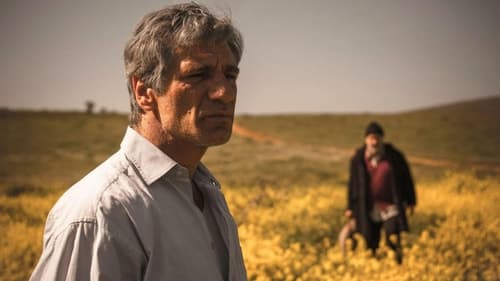
Writer
Menachem, a former frontman for a rock band, is now religious, and a father to a six-year-old. When his daughter is diagnosed with cancer, he must find a creative solution to fund the expensive treatments. He reunites his band for one last tour. The journey to save his daughter exposes old wounds and allows him to reconnect with his secular past. Menachem understands that only a new connection to his past and to his music can pave the road to his own redemption.

Director
Menachem, a former frontman for a rock band, is now religious, and a father to a six-year-old. When his daughter is diagnosed with cancer, he must find a creative solution to fund the expensive treatments. He reunites his band for one last tour. The journey to save his daughter exposes old wounds and allows him to reconnect with his secular past. Menachem understands that only a new connection to his past and to his music can pave the road to his own redemption.

Screenplay
A young officer returns to his base after a daring mission. The cook's assistant, a religious Holocaust survivor, is envious of him. He believes that there is a place in heaven reserved for the brave officer who endangers his life for the sake of his Jewish brethren. The officer, in the spirit of the Zionist ethos, is secular and a non-believer. At the moment, he is so hungry that, for a plate of shaksuka, he is prepared to sign a contract transferring his secured place in heaven to the cook. Some forty years later, the present time of the movie, the tables have turned - the officer, now a retired general, is on his death bed in the hospital. His son who, to his father's horror, has found religion, is in a race against time. Before his father dies, he has to find that cook's assistant who, forty years earlier, bought his place in heaven. If and when he finds him, the son has to nullify the contract. If he doesn't, his father will go to hell.

Director
A young officer returns to his base after a daring mission. The cook's assistant, a religious Holocaust survivor, is envious of him. He believes that there is a place in heaven reserved for the brave officer who endangers his life for the sake of his Jewish brethren. The officer, in the spirit of the Zionist ethos, is secular and a non-believer. At the moment, he is so hungry that, for a plate of shaksuka, he is prepared to sign a contract transferring his secured place in heaven to the cook. Some forty years later, the present time of the movie, the tables have turned - the officer, now a retired general, is on his death bed in the hospital. His son who, to his father's horror, has found religion, is in a race against time. Before his father dies, he has to find that cook's assistant who, forty years earlier, bought his place in heaven. If and when he finds him, the son has to nullify the contract. If he doesn't, his father will go to hell.

Director
A drama about a family's effort to save their antique restoration business.

Director
Melanoma My Love, smartly and constantly shifting somewhere between documentary and fiction, is a breath-taking drama. The film is based on the true story of the Israeli actor Yigal Adika and his wife Orit, who suffered and died of cancer. Yigal, a personal friend of the directors, plays himself in the film as Uzi and by doing so re-enacts this special period in his life. His wife is a ballet dancer and teacher. She is thirty and has been diagnosed with melanoma. With the help of her husband and doctors, she is able to believe in a favourable outcome and fights her illness to the end. The film closely follows this fight by concentrating on the two loving people, their tender relationship and the effect the situation has on the whole family.

Writer
A family of Iraqi-Israelis, each with his or her own weaknesses and determination, gathers for an Independence Day picnic. Their background stories are presented, reaching back as little as a few days or as far back as the War of Independence and the old country before that, and interlocking in ways that even they never realize.

Director
A family of Iraqi-Israelis, each with his or her own weaknesses and determination, gathers for an Independence Day picnic. Their background stories are presented, reaching back as little as a few days or as far back as the War of Independence and the old country before that, and interlocking in ways that even they never realize.

Editor
David Ofek looks back on the first Gulf War, when he was living with his parents in Ramat Gan, Israel. They are Iraqi Jews. His parents are fascinated with news reports of the bombing of Baghdad. His grandmother comes to stay with them during the SCUD attacks. Wearing gas masks, they sit in a secure room David has rigged. When the all-clear sounds, they look at photo albums. They're visited by David's girlfriend, Eve. They talk politics; grandma disapproves of Eve. Eve leaves for Eilat for respite. David images a life with Eve after the war ends







